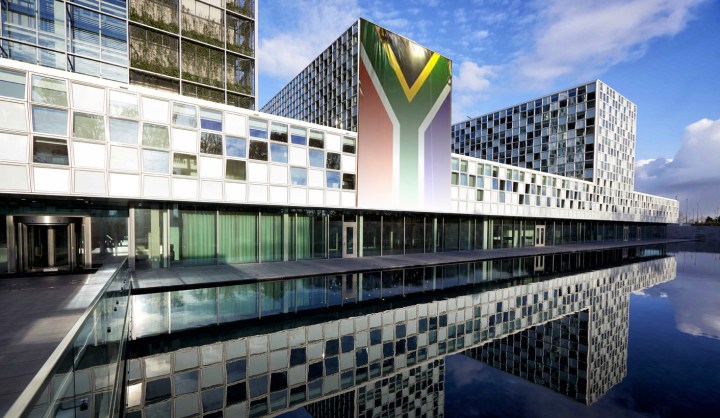Op-Ed
ICC, the premier institution for the protection of human rights

On 7 December 2018 Professor John Dugard addressed the Assembly of State Parties (ASP) of the International Criminal Court in a panel discussion. This session was initially scheduled to address the threats to the ICC made by Donald Trump, John Bolton and Mike Pompeo but on the insistence of the Bureau of the ASP the title of the session was changed to the less confrontational title of Rome Statute. 20 years. Addressing Current and Future Challenges.
In his address, Dugard declared:
This year the ICC celebrates its 20th anniversary. It is no longer the fragile institution that needs to be protected from criticism that it was 20 years ago. It must, therefore, be able to address criticisms constructively and to answer threats boldly and bravely. I hope my remarks today will be received in this spirit.
The ICC is today seen as the premier institution for the protection of human rights and for securing accountability for international crimes. Most egregious human rights violations result in the commission of international crimes. Consequently, victims have turned to the ICC rather than to the monitoring bodies of human rights conventions for relief. A prosecution in the exercise of universal jurisdiction has waned in the expectation that criminal justice will be done by the ICC. Vulnerable nations turn to the ICC for justice rather than the ICJ. The ICC must ensure that these expectations are met: that accountability is secured, that human rights are protected and that nations can obtain justice before the ICC.
At present, the rule-based international order is under threat from forces of nationalism and populism. So too are the institutions designed to protect human rights and enforce international criminal law. The Human Rights Council and the ICC are the principal targets. Earlier this year the United States withdrew from the Human Rights Council with the intention of destroying it. Now it has launched an attack on the ICC designed to destroy this institution.
There can be no doubt that the attack of John Bolton on the ICC is part of a concerted strategy on the part of the United States to destroy the ICC. It was not a random speech made by a flawed politician. It is a threat twice made by Mr Bolton and endorsed by President Trump in his speech to the General Assembly of the United Nations in September. On 4 December US Secretary of State Mike Pompeo labelled the ICC as a “rogue court” in a speech in Brussels.
In his speech to the Federalist Society Bolton directly attacks proceedings before the ICC involving two member states – Afghanistan and Palestine – and makes it clear the US will intervene to sabotage any investigations into crimes committed by US or Israeli forces. Such a threat is not only a threat to the victims of international crimes in these states. It is a threat to the ICC as a whole. This threat is to be implemented by banning ICC judges and prosecutors from entering the United States, by sanctioning their funds in the US financial system or prosecuting them in the US. It is a threat to the very existence of the ICC.
This threat calls for a strong collective response from the ASP. A response that makes it clear that the ASP is prepared to forego meetings in New York and to protect the officers of the ICC. It should be made clear that it will stand by the victims of violations of IHL in Afghanistan and Palestine and that the OTP will not delay any investigation to accommodate the US. The ASP is to the ICC what the Security Council was to the ICTY and ICTR. It is for the ASP to respond, not the Court itself. And it must do this bravely and boldly. After all, its very survival is at stake.
The Bolton speech is riddled with inaccuracies and false assumptions. But it contains some valid criticisms that have been voiced by others. Such as the lack of accountability of the OTP, corruption among ICC personnel and the preoccupation of the ICC with Africa, which Bolton describes as “the latest European colonial enterprise” to undermine the sovereignty of African states. The ASP must answer these criticisms too. It is undeniable that the EU members of the ICC drive the ICC. They ensure that weak states in Africa are targeted and that their friends elsewhere are protected. The ASP must address the criticism that the ICC is too Eurocentric in its management, too protective of European interests.
As a South African, I am pleased that the Europeans were not guided by European interests when they led the campaign against apartheid in South Africa. It is unfortunate that they do not display the same opposition to another State that practices apartheid which is currently being examined by the Office of the Prosecutor in respect of this crime.
The ICC could not have come into existence without the support of international civil society. Today many NGOs are reluctant to air their criticisms of the ICC for fear of being excluded from influence. The same can be said of the Coalition the ICC. NGOs provide the lifeblood for the ICC. They too have a responsibility to ensure that the ICC is even-handed in its prosecutions, and to stand by it when it is threatened. The ICC and two of its member states have now been directly threatened by the United States. NGOs and particularly the Coalition for the ICC have a responsibility to make their voice heard. Not only in Washington but in this meeting of the ASP which seems reluctant to confront the threat that faces it.
In going forward bravely into a critical and sometimes hostile world, the ICC must remember the experience of the ICJ. Before 1966 it was dominated by Europe. In 1966 it gave an outrageous decision in favour of apartheid South Africa. As a result, the Court was accused of being Eurocentric and racist and went into decline for some twenty years. Only in 1986 when the Court found against the United States in the Nicaragua case was the court rehabilitated and viewed as a truly international court with the courage to confront the mighty. Only then did the ICJ come of age.
The ICC, and more particularly the ASP, face a similar challenge. If the ICC is to become a universal Court, the ASP must encourage the investigation of international crimes committed by the friends of Europe, even friends that may share an Association Agreement with Europe. The ASP and institutions of the ICC do not protect the Court by refusing to investigate crimes committed by the friends of the powerful European states or by delaying prosecutions indefinitely. On the contrary, such conduct heralds the demise of the Court, as did the 1966 SWA decision of the ICJ. The threat to the continued existence of the Court arising from the failure to prosecute for political reasons is more powerful than any threat of John Bolton. The ICC, encouraged by the ASP, must ensure that vulnerable states whose salvation lies in international law, are protected by vigorous and not unduly delayed prosecutions. Only then will the ICC truly come of age as an international criminal court. DM


















 Become an Insider
Become an Insider